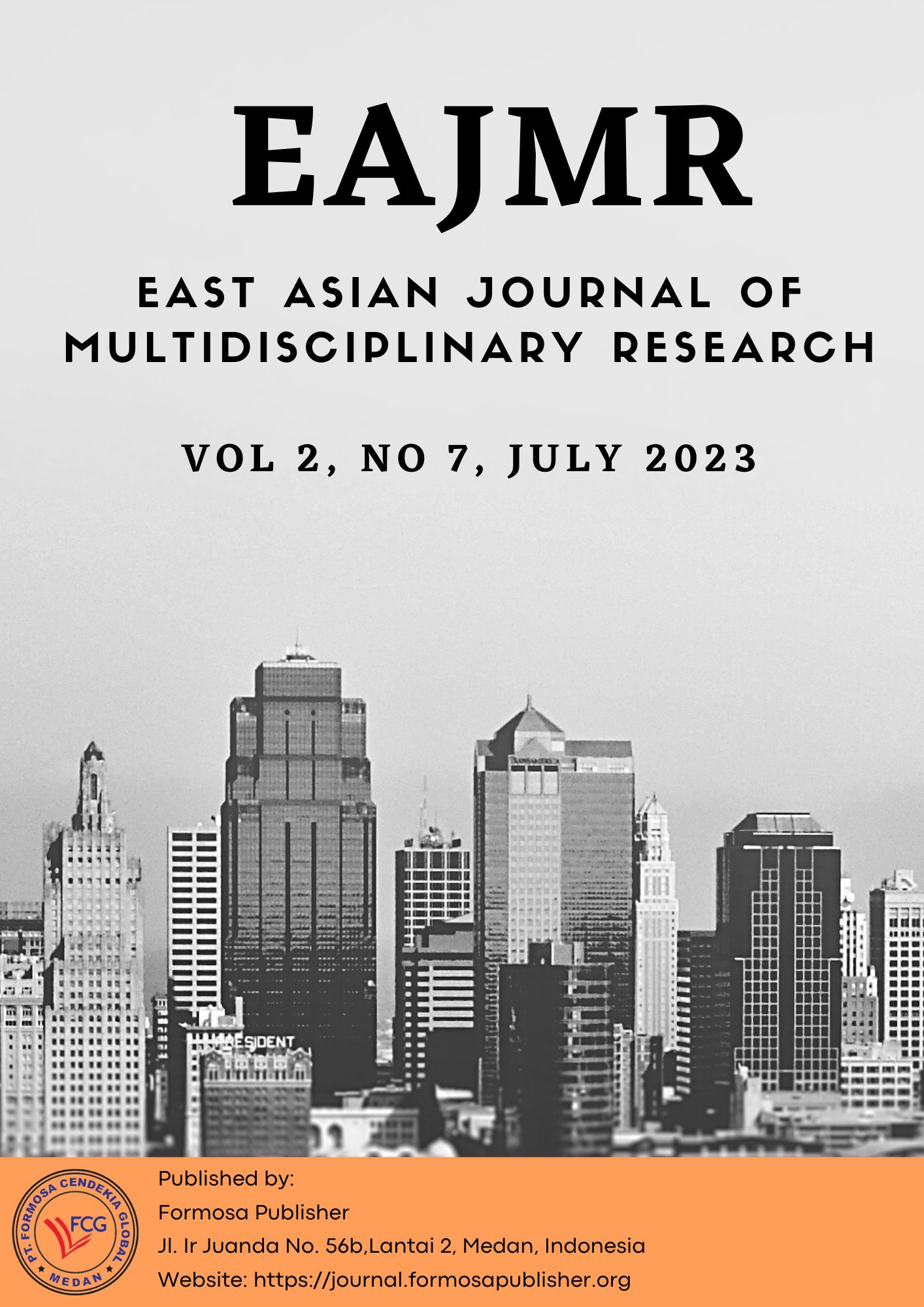Antecedents of Individual Taxpayer Compliance: A Social Norm Perspective
DOI:
https://doi.org/10.55927/eajmr.v2i7.4106Keywords:
Taxpayer Compliance, Personal Norms, Perception of JusticeAbstract
The purpose of this research is to analyze the antecedents of taxpayer compliance in terms of social rules. The population of this study is made up of individual taxpayers in Indonesia. The sampling technique uses purposive sampling, with the criteria being that individual taxpayers have a taxpayer identification number. Data collection is done by distributing questionnaires with the help of Google Forms. Data analysis uses Partial Least squares with the help of the WarpPLS tool. This study obtained the results that taxpayer compliance was influenced by personal norms and perceptions of justice, where perceptions of justice were influenced by personal norms. This study also proves that personal norms are a mediating variable, both between descriptive norms, indicative norms, and subjective norms on taxpayer compliance. In addition, this study also found that perceptions of justice mediate the relationship between trust in the government and taxpayer compliance.
References
Allingham, M. G., & Sandmo, A. (1972). Income Tax Evasion: A Theoretical Analysis. Journal of Public Economics, 1, 323–338. https://doi.org/10.4324/9781315185194
Aronson, E., Wilson, T. D., & Akert, R. . (2010). Social psychology (7th ed.). Upper Saddle River, NJ: Pearson Prentice Hall.
Bamberg, S., Hunecke, M., & Blobaum, A. (2007). Social Context , Personal Norms and the Use of Public Transportation : Two Field Studies. Journal of Enviromental Psychology, 27, 190–203. https://doi.org/10.1016/j.jenvp.2007.04.001
Baron, R. A., & Byrne, D. (2003). Social Psychology, 10th edn. Boston, MA: Allyn and Bacon.
Blanthorne, C., & Kaplan, S. (2008). An egocentric model of the relations among the opportunity to underreport , social norms , ethical beliefs , and underreporting behavior. Accounting, Organizations and Society, 33(7–8), 684–703. https://doi.org/10.1016/j.aos.2008.02.001
Bobek, D. D., Roberts, R. W., & Sweeney, J. T. (2007). The social norms of tax compliance: Evidence from Australia, Singapore, and the United States. Journal of Business Ethics, 74(1), 49–64. https://doi.org/10.1007/s10551-006-9219-x
Bordignon, M. (1993). A Fairness Approach to Income Tax Evasion. Journal of Public Economics, 52(3), 345–362. https://doi.org/10.1016/0047-2727(93)90039-V
Cialdini, R. B., Reno, R. R., & Kallgren, C. A. (1990). A Focus Theory of Normative Conduct: Recycling the Concept of Norms to Reduce Littering in Public Places. Journal of Personality and Social Psychology, 58(6), 1015–1026. https://doi.org/10.1037/0022-3514.58.6.1015
Cialdini, R. B., & Trost, M. R. (1998). Social influence: Social norms, conformity and compliance (The handbo). McGraw-Hill.
Davis, J. S., Hecht, G., & Perkins, J. D. (2003). Social Behaviors , Enforcement , and Tax Compliance Dynamics. 78(1), 39–69.
Fried, A. (2006). Why Trust Matters: Declining Political Trust and the Demise of American Liberalism. Perspectives on Politics, 4(1).
Hanafi, I. (2019, November). DJP Kalselteng men targetkan penerimaan Rp15,85 triliun. Kalsel.Antaranews.Com.
Herman, L. A., Dewi, A. S., & Dewi, M. K. (2019). Perilaku Kepatuhan Wajib Pajak Yang Dipersepsikan Melalui Faktor Deterrence, Keadilan Dan Norma Sosial. Jurnal Benefita, 1(1), 146. https://doi.org/10.22216/jbe.v1i1.3873
Holtz, B. C. (2013). Trust Primacy : A Model of the Reciprocal Relations Between Trust and Perceived Justice. 39(7), 1891–1923. https://doi.org/10.1177/0149206312471392
Jimenez, P., & Iyer, G. S. (2016). Tax compliance in a social setting: The influence of social norms, trust in government, and perceived fairness on taxpayer compliance. Advances in Accounting, 34, 17–26. https://doi.org/10.1016/j.adiac.2016.07.001
Kalbar.antaranews.com. (2019, December). Penerimaan pajak di Kalbar sudah Rp5,773 triliun. Antaranews.Com.
Kementerian Keuangan Republik Indonesia. (2019). Mengenal Rasio Pajak di Indonesia. Https://Www.Kemenkeu.Go.Id/. https://www.kemenkeu.go.id/publikasi/berita/mengenal-rasio-pajak-indonesia/
Mas’ud, A., Manaf, N. A. A., & Saad, N. (2014). Do Trust and Power Moderate Each Other in Relation to Tax Compliance? Procedia - Social and Behavioral Sciences, 164(August), 49–54. https://doi.org/10.1016/j.sbspro.2014.11.049
McCaffery, E. J., & Baron, J. (2004). Framing and Taxation: Evaluation of Tax Policies Involving Household Composition. Journal of Economic Psychology, 25(6), 679–705. https://doi.org/10.1016/j.joep.2003.07.001
Miller, A. H. (1974). Political Issues and Trust in Government: 1964–1970. American Political Science Review, 68(3), 951–972. https://doi.org/10.2307/1959140
Nakayachi, K., & Cvetkovich, G. (2010). Public trust in government concerning tobacco control in Japan. Risk Analysis, 30(1), 143–152. https://doi.org/10.1111/j.1539-6924.2009.01306.x
Pradipta, I. G. S., & Suprapti, N. W. S. (2013). Pengaruh Sikap Dan Norma Subyektif Terhadap Niat Calon Pemilih Di Kota Denpasar Untuk Memilih Partai Demokrat Dalam Pemilu Legislatif Tahun 2014. Jurnal Manajemen, Strategi Bisnis, Dan Kewirausahaan, 07(1), 29–38.
Puspa, A. W. (2019). Target Pajak Kaltim & Kaltara, Realisasi Capai 67,97 Persen. Https://Kalimantan.Bisnis.Com/. https://kalimantan.bisnis.com/read/20191016/407/1159878/target-pajak-kaltim-kaltara-realisasi-capai-6797-persen
Rudolph, T. J. (2009). Political Trust, Ideology, and Public Support for Tax Cuts. Public Opinion Quarterly, 73(1), 144–158. https://doi.org/10.1093/poq/nfp012
Sanders, D. L., Reckers, P. M. J., & Iyer, G. S. (2008). Influence of Accountability and Penalty Awareness on Tax Compliance. Journal of the American Taxation Association, 30(2), 1–20. https://doi.org/10.2308/jata.2008.30.2.1
Schwartz, S. H. (1977). Normative Influences on Altruism. Advances in Experimental Social Psychology, 10(C), 221–279. https://doi.org/10.1016/S0065-2601(08)60358-5
Suyanto. (2016). Tax Amnesty. Jurnal Akuntansi, 4(2).
Syahdan, S. A., & Rani, A. P. (2014). Dimensi Keadilan Atas Pemberlakuan PP No. 46 Tahun 2013 Dan Peningkatan Kepatuhan Wajib Pajak. Jurnal InFestasi, 10(1), 64–72.
Torgler, B. (2003). To evade taxes or not evade: That is the question. Journal of Socio-Economics, 32(3), 283–302. https://doi.org/10.1016/S1053-5357(03)00040-4
Torgler, B. (2007). Tax compliance and tax morale: A theoretical and empirical analysis. In Tax Compliance and Tax Morale: A Theoretical and Empirical Analysis. Northampton, MA: Edward Elgar Publishing, Inc.
Wenzel, M. (2005). Motivation or rationalisation? Causal relations between ethics, norms and tax compliance. Journal of Economic Psychology, 26(4), 491–508. https://doi.org/10.1016/j.joep.2004.03.003
Downloads
Published
How to Cite
Issue
Section
License
Copyright (c) 2023 Kahfi Fikrianoor, Amir Hidayatulloh

This work is licensed under a Creative Commons Attribution 4.0 International License.




























